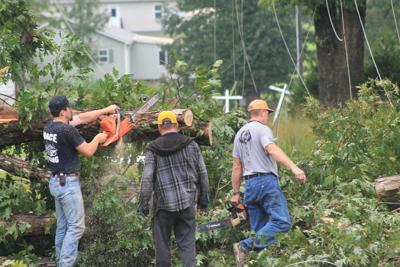Burke County is taking a step to help people recover from Hurricane Helene while preparing for future disasters with the formation of a Long-Term Recovery Group.

Volunteers help cut a tree up on U.S. Highway 70 after Hurricane Helene hit the county on Sept. 27, 2024.
The Burke Long-Term Recover Group will bring together community partners — including faith-based groups, nonprofits, government agencies, businesses and volunteers to coordinate resources, address unmet needs and ensure families receive the help they need.
An open community meeting to formalize the group will be held from 9 to 10:30 a.m. on Thursday, Sept. 11, in the lower level of Hildebran Hall on the campus of Western Piedmont Community College, located at 1001 Burkemont Ave., ¶®É«µŰ.
At this meeting, participants will:
- Vote on officers, a mission statement and a fiscal sponsor
- Adopt a name for the group
- Learn about opportunities to serve on LTRG committees
- LTRGs are a proven model across North Carolina and the nation. They exist to:
- Assess ongoing community needs after a disaster
- Develop coordinated plans that avoid duplication and maximize impact
- Access grants and funding sources to support recovery
- Strengthen partnerships to improve response for future emergencies.
People are also reading…
The Burke LTRG will include seven key committees:
- Volunteer management
- Communications
- Donations management
- Construction management
- Disaster case management
- Emotional and spiritual care
- Financial controls and reporting
In May, a steering committee was formed to assess the community’s need for such a group, identify potential members, draft and refine mission and vision statements, and lay the groundwork for a formal organizational meeting, including planning its structure and key responsibilities.
Maureen “Mo” Schwind, executive director of Burke County United Way and interim chair of the steering committee, said, “It’s essential to engage a diverse group of community members to identify and address the full spectrum of needs as well as the opportunity to coordinate services and resources through partnerships.”
Recovery groups are often formed to develop a coordinated plan for future disasters that may happen.
“Recovery doesn’t end when the storm passes — it takes long-term collaboration, resources and people willing to step up and help their neighbors,” Schwind said.
Residents, organizations, and community leaders are encouraged to attend the Sept. 11 meeting to learn more and get involved.
For more information, contact Maureen Schwind at 828-433-0681 or executive.director@bcuw.org.


















